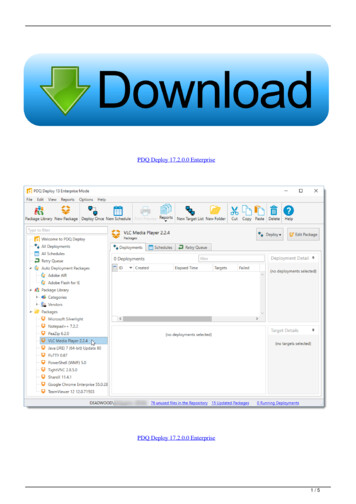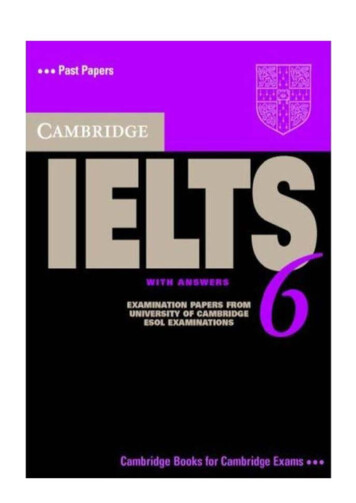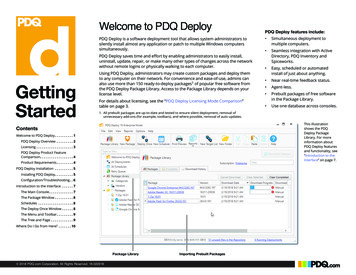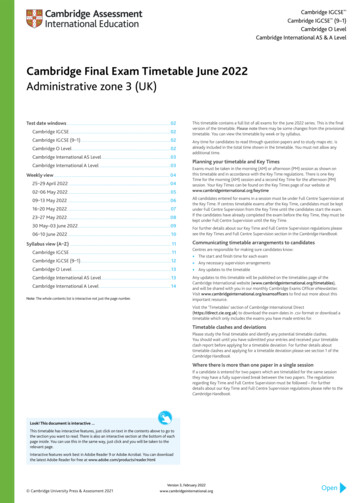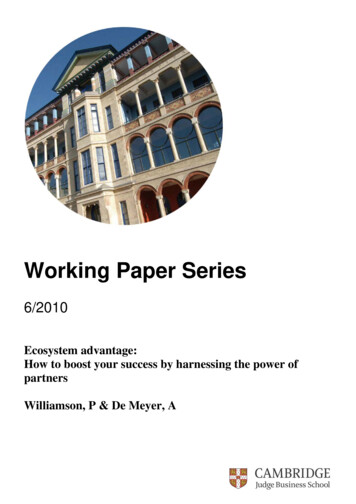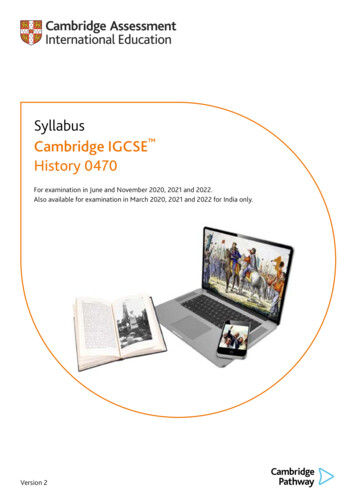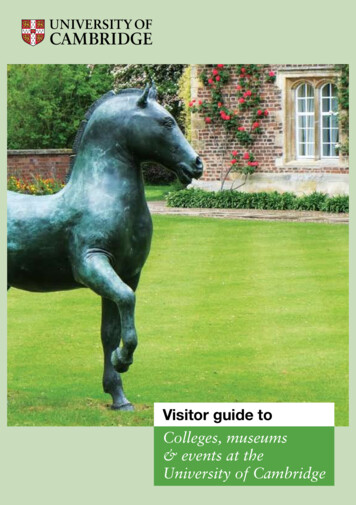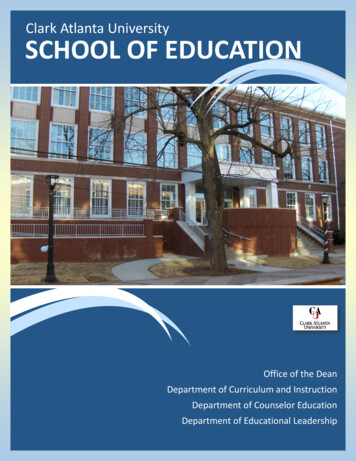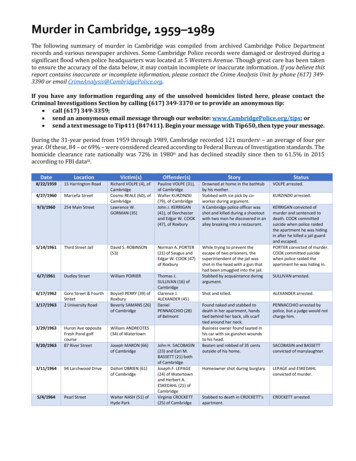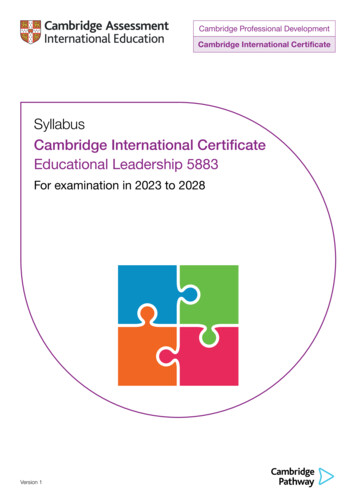
Transcription
Cambridge Professional DevelopmentCambridge International CertificateSyllabusCambridge International CertificateEducational Leadership 5883For examination in 2023 to 2028Version 1
Why choose Cambridge?Cambridge Professional Development Qualifications (PDQs) provide a strong framework to support the effectivecontinuing professional development of candidates (leaders).They help candidates to: engage critically with relevant concepts, principles, theories and best practices from around the world apply new ideas and approaches in reflective practice in their own educational context formatively evaluate experiences to plan further development transform the quality of teaching and school leadership to improve the outcomes of learners.Cambridge PDQs are designed to be integrated into schools’ professional development planning, activities andculture. They help schools to improve through cost-effective, sustainable programmes that benefit teachers andtheir learners. They demonstrate to parents, the school community and stakeholders that the school values andnurtures staff development.The Cambridge International Certificate in Educational Leadership is for candidates with leadership rolesin schools, or who are leaders (or aspiring leaders) in other parts of the educational system with directresponsibilities for teachers or leaders who want to: inform their understanding of educational leadership through an introductory study of contemporaryinternational theories and research research findings and insights about effective leadership practice from their own educational context andfrom international studies apply their leadership learning to their own leadership role and practice through critical reflection, mentoringand peer feedback identify their priorities for professional development and create a development plan to present to their ownleadership or governing body develop foundational skills in academic study, professional reflection, collaborative enquiry and academicwriting as a basis for further study.Leadership learning is based on the twin concepts of active learning and reflective practice. Candidatesincrease their knowledge of relevant theories and research findings to inform and deepen their reflections. Thequalifications aim to strengthen the ability of practising leaders to learn from experience. They do this throughthe opportunities provided to reflect, analyse and self-evaluate their actions. Alongside face-to-face sessionsand seminars, work based learning is not only encouraged but expected.Leadership learning is not only experiential, knowledge based and informed by theory. It is also concerned withensuring the effectiveness of the teams, departments and organisations that leaders lead. The qualifications aredesigned to enhance the contribution leaders make to the performance of their teams and schools.School feedback: ‘The Cambridge PDQ in Educational Leadership has given educationalleaders or aspiring educational leaders in Qatar a space to not just learn more about theintricacies involved in Educational Leadership but room to debate and discuss educationalleadership in our young country and countries from around the globe. The resources and casestudies allowed rich discussion which was not only meaningful but impactful and gives deeperunderstanding of educational leadership in all its complexities.’Feedback from: Tammy MacNeil, Head of EMC, A Part of Al Muftah Education Group; Education Division Cambridge University Press & Assessment January 2022Cambridge Assessment International Education is part of Cambridge University Press & Assessment. Cambridge University Press &Assessment is a department of the University of Cambridge.Cambridge University Press & Assessment retains the copyright on all its publications. Registered centres are permitted to copymaterial from this booklet for their own internal use. However, we cannot give permission to centres to photocopy any material that isacknowledged to a third party even for internal use within a centre.
ContentsWhy choose Cambridge?. 21 Introduction . 4Purpose of this document4Quality42 The Cambridge School Leader. 5Cambridge School Leader and Teacher Standards5Cambridge School Leader Standards5How to use the Standards63 Syllabus overview. 7The PDQ Programme Leader7The Certificate syllabus7Eligibility8Language requirements9What is the qualification structure?9What does the Certificate involve?10How is the Certificate assessed?11Evidence requirements11Reflective journal124 Certificate in Educational Leadership .13Introduction to the Certificate13Module 1 Exploring Leadership14Unit 1 Understanding key concepts and theories of leadership14Unit 2 Defining successful educational leadership practice16Unit 3 Action planning for developing leadership19Assessment criteria215 Support and resources for PDQ programmes. 23What is PDQ Connect?256 Glossary. 26
Cambridge Professional Development Qualifications – Certificate in Educational Leadership 5883 syllabus for 2023–2028.1 IntroductionPurpose of this documentThis syllabus sets out the details of the Certificate in Educational Leadership. This is a Cambridge ProfessionalDevelopment Qualification (PDQ) offered by Cambridge Assessment International Education.The syllabus focuses on the learning outcomes and related scheme of assessment. For further guidance onthe design principles and features of programmes leading to these qualifications please see the resources forCambridge Professional Development Centres.These are available at www.cambridgeinternational.org/pdqCambridge International retains the copyright on all its publications. Registered centres are permitted tocopy material from this booklet for their own internal use. However, we cannot give permission to centres tophotocopy any material that is acknowledged to a third party, even for internal use within a centre.QualityCambridge PDQs are benchmarked to the Framework for Higher Educational Qualifications (FHEQ) for England,Wales and Northern Ireland. Cambridge PDQ Certificates are benchmarked to FHEQ Level 4 and Diplomas toFHEQ Level 5.This means that teachers and leaders achieving a Cambridge PDQ are well prepared for their next step in theprofessional development pathway and their Cambridge PDQ has value as they progress to relevant Level 6and 7 programmes.School feedback: ‘Through the Cambridge PDQ and the structure of the Programme PDQCenters are able to not just give the learning opportunity but also connect leaders with otherleaders giving better understanding of different leadership styles and a forum to discuss currenteducational leadership challenges. The PDQ provides the tools to assist professional growthcreating stronger school leadership in turn stronger schools.’Feedback from: Tammy MacNeil, Programme Leader CfBT Education Services, IndiaBack to contents pagewww.cambridgeinternational.org/pdq4
Cambridge Professional Development Qualifications – Certificate in Educational Leadership 5883 syllabus for 2023–2028.2 The Cambridge School LeaderCambridge International programmes and qualifications develop not only subject knowledge and skills but alsoattitudes, ways of thinking and behaviours.There are five Cambridge School Leader attributes. Cambridge School leaders are: confident in their role of leadership, taking into account the vision, mission, culture and priorities of theirschool, and in exercising the knowledge, understanding, skills and qualities that their leadership positionrequires responsible within the scope of their role for the well-being, progress and achievements of all learners andthe professional practice, well-being and development of their staff reflective in their own professional practice, seeking continually to improve their leadership throughfeedback from colleagues, personal research and self-reflection innovative in applying their knowledge, understanding and personal and professional skills to leadershiptasks and challenges engaged in the improvement of learning and in securing the best educational outcomes for all theirlearners, through the professional development of all their teachers.More information on the Cambridge teacher and Cambridge learner attributes can be found ership matters: it makes a difference to the quality of learning and teaching and the performance ofschools. Today, we can identify the key ingredients of successful leadership. We can learn from educationalresearch, including studies of school leaders in action in different countries and in high-performing schoolsystems. We can also learn from research and experience outside education.Cambridge School Leader and Teacher StandardsOur Cambridge Teacher and School Leader Standards define what we believe to be key characteristics ofeffective teaching and leadership. They focus on supporting teachers and leaders, and they offer an opportunityfor self evaluation which helps them to understand their professional learning and development needs.The Standards are based on the latest international research into effective teaching and school leadership,taking into account a wide range of international practices and advice from education experts around the world.Cambridge School Leader StandardsThe Cambridge School Leader Standards can be used to: evaluate current leadership practice help identify, prioritise and plan areas for professional development review and identify the development needs of your senior team help illustrate a school-wide leadership framework and expectations to your school board, governing bodyand parent community.Back to contents pagewww.cambridgeinternational.org/pdq5
Cambridge Professional Development Qualifications – Certificate in Educational Leadership 5883 syllabus for 2023–2028.The Cambridge School LeaderHow to use the StandardsThe Standards can be used to evaluate teaching or school leadership by asking key questions and looking forexamples from practice. By using our RAG grids leaders can identify where they are now and which areas theyneed to improve. This would be a really useful exercise to undertake while planning a PDQ programme. It couldalso be used again to evaluate the programme’s impact.You can download the Standards, RAG grids and online guide acher-standardsBack to contents pagewww.cambridgeinternational.org/pdq6
Cambridge Professional Development Qualifications – Certificate in Educational Leadership 5883 syllabus for 2023–2028.3 Syllabus overviewThe PDQ Programme LeaderEvery Cambridge PDQ Centre appoints a Programme Leader who is responsible for designing and managingthe programme. The Programme Leader is pivotal to the quality and success of the Cambridge PDQprogramme. The role is wide-ranging, from designing and developing the programme to liaising with mentors,school leadership and Cambridge International. Being an effective Programme Leader is about shaping andsupporting professional learning to have an impact on the quality of teaching and leadership in schools.Programme Leaders evaluate their professional development learning programme as part of their commitmentto professional development. Due to the level of support they are required to give candidates during theprogramme, Programme Leaders are not permitted to compile their own portfolio of evidence and submit it toCambridge International as part of their own PDQ Programme.The revised Certificate has been designed to help leaders develop their professional thinking and practice, andenhance their: knowledge, skills and understanding of effective leadership leadership practice school and its effectiveness.The Certificate syllabusThe Certificate is grounded in the idea that leadership learning is an active process. Practising leaders do notpassively receive information and knowledge, but construct it for themselves and examine ideas and insights inthe light of their own experience and behaviour. The content explored in the qualifications is used to stimulatethinking, to challenge candidates’ assumptions and to shape their leadership practices. Both qualificationsplace strong emphasis on increasing candidates’ knowledge and understanding of effective leadership. This willimprove their own practice and the performance of the schools in which they work.The Certificate is for those who have a leadership role in schools, but also those who work in school districts,regional centres or other parts of the educational system.The qualification is inclusive and relevant to leaders in all teaching and learning contexts: from primary andsecondary general education, to adult and higher education. It helps leaders to explore and apply new ideasin their own context, integrate new approaches in their own practice, and demonstrate their professionaldevelopment as reflective practitioners.These qualifications help practising leaders to study what is known about successful leadership; to focus onthe key ideas and challenges, leadership theories, strategies and actions of highly effective leaders; and todevelop their reflective practice as leaders. They encourage leaders to: increase their knowledge and understanding of successful leadership develop their leadership skills self-evaluate their approaches to leadership reflect on their leadership practices enhance their performance as leaders.Back to contents pagewww.cambridgeinternational.org/pdq7
Cambridge Professional Development Qualifications – Certificate in Educational Leadership 5883 syllabus for 2023–2028.Syllabus overviewThe programme involves a spiral of professional learning, each stage being a cycle of experiential learning andreflective practice following on from the previous cycle and leading on to the next. Areas of learning are revisitedsystematically within the programme so that the candidate can engage with these in more depth and detail,and acquire related knowledge and skills.The spiral of professional learning in a Cambridge PDQ programme depends particularly on three processes: research reflection learning with and from mentors.These processes work together. It is crucial that learners receive feedback to inform their continuous reflectionon their learning experiences. Observation and reflection are much more effective with the support of a mentor.The mentor develops a learning relationship with the candidate, supporting them during their work-basedlearning to make the most of the learning experience and to achieve the Cambridge qualification. The mentorunderstands the essential principles of the Cambridge PDQ, and provides helpful advice to their candidate,sharing their own experiences and knowledge.EligibilityCandidates must: have a leadership role in a school, or be a leader (or an aspiring leader) in other parts of the educationalsystem have direct responsibility for teachers or leaders be able to try out, in practice, in their workplace, what they learn during their studyCandidates who do not meet the above criteria cannot make an entry for this syllabus.School feedback: ‘Having the continued support and guidance of mentors throughout the PDQcourse has been invaluable for both our candidates and the mentors themselves. We have seenan improvement in reflective practice and an increase in willingness to experiment with bestpractices. The candidates find they have a safe space to collaborate, share their experiencesand ask for advice. This has empowered and made them more open to developing theirpractice.’Feedback from: Melissa Alberts, Professional Development Officer, GenEx Institute, Cape Town, South AfricaBack to contents pagewww.cambridgeinternational.org/pdq8
Cambridge Professional Development Qualifications – Certificate in Educational Leadership 5883 syllabus for 2023–2028.Syllabus overviewLanguage requirementsTo take part in the Certificate programme candidates are required to have sufficient competencein English. All candidates should have English language competence comparable to Level B2 inthe Common European Framework of Reference for Languages (CEFR). This frameworkis provided by the Council for Europe. Further details can be found on the Council’s website athttp://coe.int/t/dg4/education/elp-reg/cefr grids EN.aspWe recommend a minimum requirement of 5.5 on the International English Language Testing System.See www.ielts.org/ for more details.What is the qualification structure?Module 1 can be taken on its own as the Certificate. Candidates can then progress to Modules 2 and 3 tocomplete the Diploma.The Diploma can also be taken as a standalone qualification.Module 1Module 2CertificateModule 3DiplomaThe table below shows what is involved in each module.Learning hours in preparation150Recommended programmeduration4 months per moduleAssessmentPortfolio of evidence of practice,learning and reflectionEvidence length3600 words with work-based recordsBack to contents pagewww.cambridgeinternational.org/pdq9
Cambridge Professional Development Qualifications – Certificate in Educational Leadership 5883 syllabus for 2023–2028.Syllabus overviewWhat does the Certificate involve?A typical Certificate programme run by a Cambridge Professional Development Centre consists of a broadbalance of activities, appropriate to the needs and circumstances of teachers and their schools. Theprogramme is planned by the centre’s programme leader and team as a coherent sequence of learning overtime, with a variety of elements.150 hoursided learningGule a r n in gald u leIn divi ec o l l a b o ra t i v50hoursasar &ninged50 50hours hoursWork-bCentres must provide at least 50 hours of guided learning for each module. Candidates should integrate asmuch preparation time as possible into their day-to-day practice. They should allow time for backgroundreading and discussion with their colleagues, to enrich their reflective practice.In each unit, candidates engage with the required learning outcomes through a series of activities closelyrelated to their everyday professional work. The activities and related reflections produce evidence forassessment.The mentor plays a vital role in supporting a candidate. Through discussion and questioning, mentorsencourage candidates to reflect on their learning and on what it means for their approaches to teaching.They also help candidates to demonstrate through examples and accounts of practice that they are: acquiring new skills learning how to use their new skills and knowledge linking changes in leadership practice to improvements in learner outcomes.Back to contents pagewww.cambridgeinternational.org/pdq10
Cambridge Professional Development Qualifications – Certificate in Educational Leadership 5883 syllabus for 2023–2028.Syllabus overviewHow is the Certificate assessed?Candidates are assessed through a portfolio of evidence, submitted to a team of Cambridge Internationalexaminers. In their portfolio, candidates demonstrate their knowledge, skills and understanding of leadership inthe context of their own work. Portfolio evidence includes: reviews of key concepts and theories of leadership evaluation of their job descriptions and their leadership contexts reflections on their leadership skills and practice and action planning for development interviews with experienced leaders and feedback from them analyses of the skills and practices of effective leaders analysis of their own leadership learning and feedback from peers and mentors a Professional Development Plan for their future leadership developmentSchool feedback: ‘We have utilised the Cambridge PDQ program to foster a rich, collaborative,Community of Practice that has helped to knit our school together with learners, teachers, andadministrators identifying as being part of a supportive Learning Organisation in which everyonemodels a love of learning and support for others.’Feedback from: Dr. Russell Hazard, Director of Teaching, Learning, and innovation – NIT Education GroupEvidence requirementsIn their portfolio, candidates will use the relevant Cambridge International templates (Forms) to gather, organiseand present their evidence to satisfy the assessment criteria.In the introduction to the portfolio, candidates provide background information about their professionalexperience and role, and the context in which they teach. This is their opportunity to indicate significantinfluences on their work and professional development. Although the introduction is not formally assessed orjudged, it does help the examiner to understand the teaching context and interpret the subsequent assessmentevidence. Please note, however, that a curriculum vitae is not required.With written evidence, candidates should keep to the word limits and respond to the prompts in templatessuccinctly. The prompts indicate how to focus and shape explanations, reflections and other evidence.Candidates must also follow Cambridge International’s rules for the format and size of digital evidence, such asimages and video.Candidates’ reflections should provide references for other people’s ideas and experiences, whether these arein the form of academic publications, or posts to online discussion forums or blogs. All sources must be clearlyreferenced.The Programme Leader can provide further guidance on academic honesty.Back to contents pagewww.cambridgeinternational.org/pdq11
Cambridge Professional Development Qualifications – Certificate in Educational Leadership 5883 syllabus for 2023–2028.Syllabus overviewReflective journalCandidates will maintain a reflective journal throughout their programme of learning. By keeping a journal,candidates will evaluate more effectively their practice and develop reflective skills which will underpin theirprofessional development.For further support on reflective practice arning/getting-started-with/School feedback: ‘Reflecting has become second nature to our candidates. With reflectivepractice being a vital part of the PDQ courses, the benefits and importance have becomeapparent, and there is no turning back. It is become part of everyday classroom practice andschool culture, both for the educators and students.’Feedback from: Melissa Alberts, Professional Development Officer, GenEx Institute, Cape Town, South AfricaSchool feedback: ‘The PDQ has provided the framework to articulate, formalise and enhancethe things I was doing naturally as a teacher, it has encouraged me to be a reflective practitionerand to back my intuition.’Feedback from: Mrs Wendy H McCabe, Head of Art and Design, Head of Drama, Hebron School, Tamil Nadu, SouthIndiaBack to contents pagewww.cambridgeinternational.org/pdq12
Cambridge Professional Development Qualifications – Certificate in Educational Leadership 5883 syllabus for 2023–2028.4 Certificate in Educational LeadershipIntroduction to the CertificateAimsIn the Certificate, candidates will have the opportunity to: understand key leadership theories and ideas, from inside and outside of education, and apply these tothinking about their own practice draw on evidence from research and practice to develop knowledge with an understanding of what isknown about effective leadership relate these to their own leadership context in planning actions develop their reflective practice skills to help them to evaluate and improve their own leadership practice learn collaboratively, supported by a mentor, to share insights, and develop knowledge and skills.Programme content will typically include: key findings from effective leadership research major leadership theories implications of leadership theory for practitioners leadership in other contexts, countries and school systems lessons learned from their own practice as leaders leading teams developing their own effectiveness and that of others.StructureThe Certificate comprises three units related to practice which together form Module 1: Exploring leadership.Unit 1Understanding key concepts and theories of leadershipUnit 2Defining successful educational leadership practiceUnit 3Action planning for developing leadershipEach unit is set out in terms of its learning outcomes, key questions, assessment approach and evidencerequirements. Assessment criteria appear at the end of this section. Each learning outcome is a statement that defines the expected goal of a curriculum in terms ofdemonstrable skills or knowledge that will be acquired by the candidate. The key questions show professional learning related to each learning outcome. These questions willsupport the candidate as they explore the knowledge required to meet the learning outcome. The assessment approach and evidence requirements explain how candidates can show that theyhave achieved the learning outcomes. The assessment criteria are used by Cambridge International examiners in their judgements onthe quality of the evidence presented. They specify what the candidate is expected to do in order todemonstrate that they have achieved a learning outcome.Back to contents pagewww.cambridgeinternational.org/pdq13
Cambridge Professional Development Qualifications – Certificate in Educational Leadership 5883 syllabus for 2023–2028.Certificate in Educational LeadershipModule 1 Exploring LeadershipUnit 1 Understanding key concepts and theories of leadershipCandidates will explain their understanding of the main ideas and theories related to leadership.Learning outcomesA: Explain their understanding of key concepts and theories of leadership.B: Apply a new concept or theory of leadership to their own context.C: Demonstrate an awareness of the contextual nature of leadership and the ways in which context affectsleadership action.D: Use a selection of the concepts and theories to reflect upon their own leadership role and context.Learning outcomes and key questionsLearning outcome A: Explain their understanding of key concepts and theories of leadership. What did the concept of ‘leadership’ mean to you before you began to study for this unit? Has your previous development as a leader been influenced by leadership theories or by the example ofother leaders? Of the new concepts and theories of leadership that you have studied, which do you think are important,and why? Which new concept or theory is most relevant to your school or school leadership? Which new concept or theory is most relevant to your own role and leadership development?Learning outcome B: Apply a new concept or theory of leadership to their own context. What are the key insights about leadership in the new concept or theory that you have chosen? Why do you think these are relevant to your school’s or your own leadership? What might be the key changes to your school’s or your own leadership if your chosen concept or theorywas applied in your context? What would be the challenges and the benefits in applying the concept or theory? Are there things about the concept or theory that might be inappropriate if applied in your schoolcontext?Learning outcome C: Demonstrate an awareness of the contextual nature of leadership and the ways inwhich context affects leadership action. In what ways do the circumstances in which leaders find themselves affect what they are able to achieveas leaders? Do successful leaders adapt to their circumstances or change them? From your research, what are the distinctive features of your own educational context that affect whatschool leaders can do or how they do it? What are the key contextual factors that influence your own leadership? How have these factors affected your leadership practice or development?Back to contents pagewww.cambridgeinternational.org/pdq14
Cambridge Professional Development Qualifications – Certificate in Educational Leadership 5883 syllabus for 2023–2028.Certificate in Educational LeadershipLearning outcome D: Use a selection of the concepts and theories to reflect upon their own leadership roleand context. In your study for this unit, what ideas have strengthened and supported your current practice as aleader? What ideas have made you rethink your approach to the challenges you face as a leader? What concepts or theories have given you new ideas about or perspectives on your role? How could these ideas influence your understanding of your leadership role and context in the future? How could these ideas influence the development of your leadership learning and practice in future?The role of the mentor in Unit 1The mentor will hold a discussion with the candidate using the Leadership Professional Discussion Template forguidance.AssessmentCandidates will: create an annotated reading list based on their reading for this unit critically evaluate their job description based on their reading for this unit hold a discussion with their mentor in which they discuss reasons for selecting specific areas of leadershippractice and their emerging understanding of successful leadership.In the portfolio, candidates must submit the following:Evidence of practice – This includes: an annotated reading list Module 1: Unit 1 Job Description Evaluation Form Module 1: Unit 1 Leadership Discussion with their Mentor FormEvidence of learning (800 words)A review of s
4 Certificate in Educational Leadership . 13 Introduction to the Certificate 13 Module 1 Exploring Leadership 14 Unit 1 Understanding key concepts and theories of leadership 14 Unit 2 Defining successful educational leadership practice 16 Unit 3 Action planning for developing leadership 19 Assessment criteria 21 .
